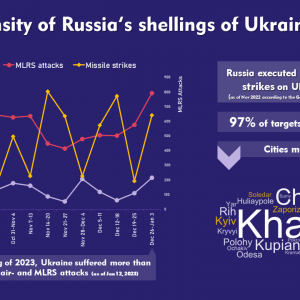As the Russo-Ukrainian war continues to unfold, the relationship between China and Russia has come under intense scrutiny. Despite their apparent partnership, there are signs that China is maintaining strategic ambiguity in its relationship with Russia.
For years, China and Russia have been portrayed as close partners. Yet, the recent events in Ukraine have exposed cracks in their relationship. One glaring example is Russia’s decision to place tactical nuclear weapons in Belarus, shortly after agreeing with China that no country should deploy nuclear weapons abroad. This move raises questions about Russia’s commitment to its agreements with China, and whether China can trust its unpredictable neighbor.
Putin’s recent meeting with China’s Defense Minister Li Shangfu in Moscow highlights the Russian president’s limited diplomatic options, as his international standing has been damaged by the invasion of Ukraine. By engaging with Li, Putin aims to demonstrate that he still maintains high-level connections, despite facing criticism from China for deploying tactical nuclear weapons in Belarus and estrangement from numerous global leaders.

Given that Li is not an equivalent counterpart to Putin, their meeting may inadvertently imply China’s perceived superiority, emphasizing the asymmetry in the Sino-Russian relationship. As Russia and China purport to be equal parties in their “No-Limits Partnership,” Putin and Russian media are compelled to consistently reaffirm their collaboration to maintain appearances, even as they struggle to secure genuine allies.
The recent phone conversation between Chinese President Xi Jinping and Ukrainian President Volodymyr Zelenskyi in their first known conversation since Russia’s invasion signifies a subtle shift in China’s stance. China’s continued engagement with Ukraine, especially at a time when the latter has demonstrated tenacity and resilience in the face of Russian aggression, illustrates that Beijing acknowledges Ukraine’s burgeoning strength.
The stark contrast between the claimed quick victory and the prolonged conflict, which has highlighted Russia’s military limitations, may cause China to reassess its strategic calculations. Zelenskyi’s firm stand on Ukraine’s territorial integrity, coupled with Xi’s emphasis on mutual respect for sovereignty, underscores China’s recognition of Ukraine’s fortitude, which aligns with Beijing’s respect for strength and stability. The appointment of Li Hui, a seasoned diplomat with intimate knowledge of Russia, as the envoy to Ukraine shows China’s seriousness about positioning itself as a peacemaker in the conflict. This strategic repositioning signals that China is gradually moving away from a Russia-centric approach and is willing to engage more directly with Ukraine. By doing so, China is demonstrating its ability to adapt its foreign policy to the evolving geopolitical landscape, which is characterized by the “unexpectedly” protracted Russo-Ukrainian war. Conversely, the relationship between China and Russia is not without its complexities.

First of all, China’s approach to separatist movements starkly contrasts with Russia’s. While China has always considered Taiwan to be a part of its territory and treated separatist movements with hostility, Russia has actively supported and established separatist “republics” in countries such as Moldova, Georgia, and Ukraine. This difference in strategies may create discomfort between the two nations, as China may view Russia’s actions as undermining the territorial integrity of sovereign states, a principle that Beijing holds dear.
Historically, both China and Russia are led by authoritarian regimes with ambitions for their respective countries to become leading global powers. However, their shared ambitions do not guarantee a harmonious relationship. Competition for influence and resources, along with differences in their strategic objectives, could result in a rivalry rather than a partnership.
Though China has refrained from openly condemning Russia’s invasion of Ukraine, its ambiguous stance suggests a calculated effort to maintain a neutral position. China’s neutrality is, without any doubt, pro-Russian. This implies that China may be cautious about aligning too closely with Russia, given its aggressive actions and the potential backlash from the international community.
Chinese media coverage of war has also been notably restrained in 2023, possibly to avoid antagonizing either side. This careful approach reflects the Chinese government’s awareness of the potential risks associated with taking a firm position on the matter.
Despite the appearance of a strong partnership, there are clear differences in their strategies and objectives. China’s ambiguous stance on Ukraine, along with its cautious approach to its relationship with Russia, reveals the possibility of a growing rift between the two powers.
China’s apparent neutrality in the Russo-Ukrainian war may be driven by multiple factors, including economic considerations and the desire to maintain strategic partnerships. As the United States and its allies impose strict sanctions on Russia, China has managed to exploit the situation to its advantage, securing access to cheap energy resources and opening new trade opportunities.
One of the ways in which China is taking advantage of the situation is by purchasing cheap fuel and gas from Russia. As Western nations impose sanctions on Russian energy exports, China has significantly increased its imports of Russian oil and natural gas. In 2022, China’s overall trade with Russia reached a 30% increase compared to the previous year. This surge in trade has made China Russia’s most important trading partner, particularly as Russia’s trade with Western countries plummeted in the wake of its invasion of Ukraine.

In addition to energy resources, China has been expanding its military production capabilities and is now the world’s fourth-largest arms exporter. While the US accuses Chinese firms of providing “non-lethal support” to Russia, experts suggest that Beijing may also be secretly selling high-tech products that could be used for military purposes, such as semiconductors and civilian drones. By exploiting the gray area between civilian and military applications, China can continue to support Russia’s military efforts while maintaining plausible deniability.
China’s economy has been under pressure in recent years while the nation is continuously working on increasing its military capabilities to conduct future military operations against Taiwan. By maintaining a neutral stance on Russia’s invasion of Ukraine, China can avoid further sanctions from the US and its allies while still benefiting from its relationship with Russia. This strategy allows China to strengthen its position on the global stage without overtly supporting Russia’s aggressive actions. On one hand, it allows China to avoid economic sanctions for providing Russia with the equipment and weapons it needs. On the other hand, it enables China to exploit Russia’s vulnerability and gain access to valuable resources and trade opportunities. This calculated approach illustrates China’s keen awareness of the geopolitical implications of the Russo-Ukrainian war and its ability to navigate the complex landscape to its advantage.
It is crucial for policymakers and experts to recognize the underlying economic and strategic motivations behind China’s ambiguous stance. Understanding these motivations will be essential in anticipating future geopolitical developments and formulating appropriate responses. The West should carefully reconsider its concerns about providing extensive support to Ukraine, as it may not necessarily result in pushing Russia further into China’s sphere of influence.
China is cautious about the prospect of being sanctioned and is aware of the risks associated with aligning too closely with Russia. The significant war losses that Russia has suffered in Ukraine may lead to a Chinese reassessment of Russia’s military strength, as its previously propagated image of invincibility has been called into question by the reality on the ground. China, as a strategic global player, tends to align with nations that demonstrate strength and stability.
By providing extensive support to Ukraine, the West can showcase its resolve and commitment to maintaining global security, potentially deterring China from further deepening its ties with Russia.
Maksym Skrypchenko, President of the Transatlantic Dialogue Center


